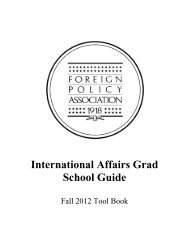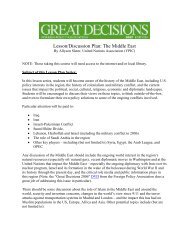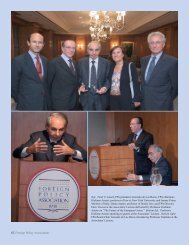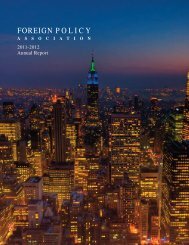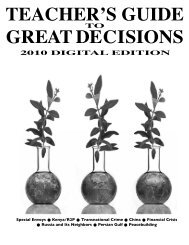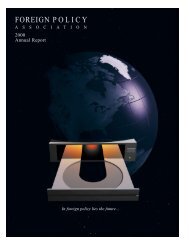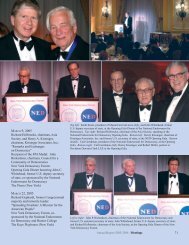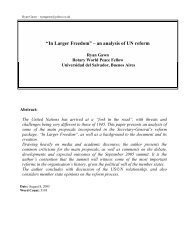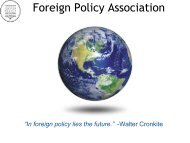Celebrating 90 Years - Foreign Policy Association
Celebrating 90 Years - Foreign Policy Association
Celebrating 90 Years - Foreign Policy Association
Create successful ePaper yourself
Turn your PDF publications into a flip-book with our unique Google optimized e-Paper software.
TRANSFORMATIVE RESULTS OF INTELLECTUAL<br />
FREEDOM<br />
As I mentioned before, our universities<br />
serve the nation well, not only by educating<br />
students who stay in our country, but also<br />
by educating those who return to their home<br />
countries. In some cases, we would gain even<br />
more by retaining them here, but those who<br />
return home typically serve as ambassadors<br />
for American values. I have already cited one<br />
example: the pressures for curriculum reform<br />
and critical thinking in China, which will, in the<br />
long run, carry with them demands for political<br />
reform. If you teach people to be independent<br />
thinkers, then they are going to be independent<br />
thinkers. The pressures of independent thinkers,<br />
along with pressures for greater freedom<br />
of expression on university campuses in China,<br />
are coming in large measure from those educated<br />
in the United States.<br />
The pressures for curriculum<br />
reform and critical thinking in<br />
China will, in the long run, carry<br />
with them demands for political<br />
reform. If you teach people to<br />
be independent thinkers, then<br />
they are going to be indepen-<br />
dent thinkers.<br />
Again and again, I encounter international<br />
students at Yale who tell me that they<br />
are astounded by the degree of openness and<br />
intellectual freedom that they find in America.<br />
When I travel abroad, I see senior leaders in<br />
influential positions whose views of the world<br />
have been transformed by their educational<br />
experience in the United States.<br />
TODAY’S IMPERATIVE FOR STUDY ABROAD<br />
Let me talk a little about sending our students<br />
abroad. Increasingly, American universities<br />
are encouraging domestic undergraduates<br />
to spend time in another country. Traditional<br />
junior-year-abroad programs remain widely<br />
available. They attract a large fraction of<br />
students at certain institutions, such as Dartmouth<br />
and Middlebury, which have promoted<br />
them very effectively.<br />
But only a modest fraction of undergraduates<br />
at Yale spend part of a junior year, or all<br />
of a junior year, overseas. The reason they stay<br />
in New Haven is because they love New Haven.<br />
It’s actually true. But we have responded by offering<br />
every undergraduate at least one opportunity<br />
for international study or for a working<br />
internship either during the academic year or<br />
during the summer. Most students choose the<br />
summer. We provide the financial resources to<br />
make it possible. Every student on financial aid<br />
is fully supported in overseas study, even in the<br />
summer.<br />
By mobilizing our alumni around the<br />
world, we have created a superb infrastructure<br />
of serious summer work internships in seven-<br />
FOREIGN POLICY ASSOCIATION | 27<br />
PRESENTATION BY RICHARD LEVIN



